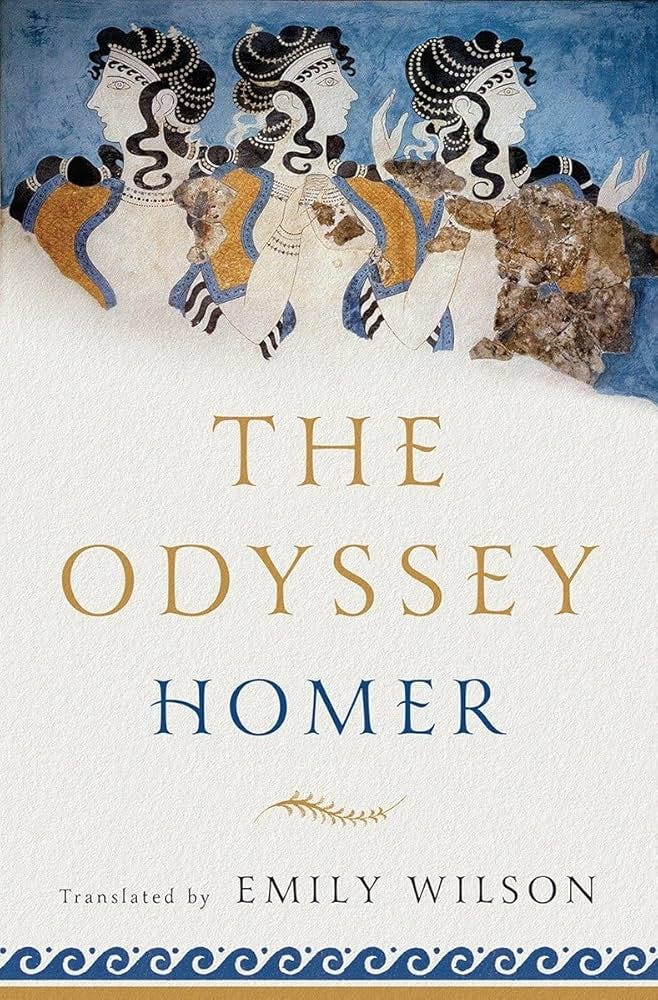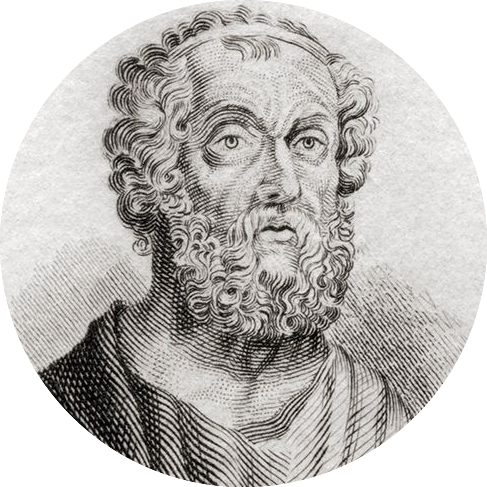The Odyssey by Homer: A Preview and Reading Schedule
Join us starting February 5 to read Emily Wilson's translation of Homer's The Odyssey with Stefania Heim
We're delighted to have Stefania Heim joining us to host an APS Together reading of Emily Wilson’s translation of Homer's The Odyssey. We start Wednesday, February 5 and finish March 16. Stefania's daily notes will be posted here every morning. A preview, and the reading schedule, are below.
A Note from Stefania Heim
Homer’s Odyssey is a story about a person trying to find his way home. It is a story about a warrior grappling with the end of war. It is a story about women seizing power through any available means. It is a story about monsters, witches, and gods. It is a story about hubris. It is a story about marriage. It is a story about the pressures of growing up. It is a story about telling stories.
I came to The Odyssey late, when my first daughter was young and obsessed with the d’Aulaires’ Book of Greek Myths, bought for her by a close friend of mine whose own childhood was shaped by those stories and drawings. One thing led to another—hours examining the image of some cyclopes behind Hephaestus in the d’Aulaires’ led to Gillian Cross and Neil Packer’s illustrated Odyssey, led to long family drives accompanied by audiobooks of various Odyssey translations and heated arguments about their merits, led to my husband and me building an experimental summer course around revisions of The Odyssey’s central theme of nostos, the search for home. When Emily Wilson’s riveting and radically direct translation was published, it was a family event—we read it slowly together, daily, during lockdown, and it brought my younger daughter under its spell too. A communal event.
The Odyssey is a story that has been retold countless times; indeed, it is a story that has always existed through and as retelling. As riffs and reverberations and revisions and rebuttals. And, not just in the places and forms you expect. Translating Giorgio de Chirico’s posthumous novel Mr. Dudron, the meandering, humorous, and totally ordinary adventures of a roving, dreaming painter, I realized, Hey! This is The Odyssey!
I am excited to read The Odyssey along with you; to pay close attention to the ways Wilson retells it, and to bring in some of the epic’s many riffs and reverberations along the way.
Daily Reading
Day 1 (February 5) Book 1, line 1-444
Day 2 (February 6) Book 2, lines 1-434
Day 3 (February 7) Book 3, lines 1-497
Day 4 (February 8) Book 4, lines 1-346
Day 5 (February 9) Book 4, lines 347-847
Day 6 (February 10) Book 5, lines 1-228
Day 7 (February 11) Book 5, lines 229-493
Day 8 (February 12) Book 6, lines 1-331
Day 9 (February 13) Book 7, lines 1-348
Day 10 (February 14) Book 8, lines 1-254
Day 11 (February 15) Book 8, lines 255-586
Day 12 (February 16) Book 9, lines 1-251
Day 13 (February 17) Book 9, lines 252-566
Day 14 (February 18) Book 10, lines 1-272
Day 15 (February 19) Book 10, lines 273-574
Day 16 (February 20) Book 11, lines 1-336
Day 17 (February 21) Book 9, lines 337-640
Day 18 (February 22) Book 12, lines 1- 208
Day 19 (February 23) Book 12, lines 209-453
Day 20 (February 24) Book 13, lines 1-187
Day 21 (February 25) Book 13, lines 188-440
Day 22 (February 26) Book 14, lines 1-359
Day 23 (February 27) Book 14, lines 359- 533
Day 24 (February 28) Book 15, lines 1-261
Day 25 (March 1) Book 15, lines 262-557
Day 26 (March 2) Book 16, lines 1-226
Day 27 (March 3) Book 16, lines 227-481
Day 28 (March 4) Book 17, lines 1-328
Day 29 (March 5) Book 17, lines 329-606
Day 30 (March 6) Book 18, lines 1-187
Day 31 (March 7) Book 18, lines 188-429
Day 32 (March 8) Book 19, lines 1-308
Day 33 (March 9) Book 19, lines 309-604
Day 34 (March 10) Book 20, lines 1-394
Day 35 (March 11) Book 21, lines 1-435
Day 36 (March 12) Book 22, lines 1-262
Day 37 (March 13) Book 22, lines 262-501
Day 38 (March 14) Book 23, lines 1-372
Day 39 (March 15) Book 24, lines 1-205
Day 40 (March 16) Book 24, lines 206-549
Stefania Heim is translator of Geometry of Shadows: The Italian Poems of Giorgio de Chirico and de Chirico’s posthumous novel, Mr. Dudron, both published by A Public Space Books. She is also author of the poetry collections Hour Book and A Table That Goes on for Miles. With Catherine Gander, she is editing Beyond Ourselves: Contemporary Poets on Muriel Rukeyser. She is an associate professor of literature at Western Washington University.
Homer is the name attached to the ancient Greek poet who is the presumed author of The Odyssey and The Iliad. To this day, the “Homeric questions” persist: Was Homer an individual? Who was he / who were they?
Emily Wilson is a classicist and translator who serves as a professor of classical studies and chair of the program in comparative literature and literary theory at the University of Pennsylvania. She was the first woman to translate The Odyssey into English. She has also published an award-winning translation of The Iliad as well as translations of other works by Sophocles, Euripides, and Seneca. She has been named a fellow of the American Academy in Rome in Renaissance and early modern scholarship, a MacArthur Fellow, and a Guggenheim Fellow.








So happy and ready to read this for the first time with APS! I bought the new translation when it came out and I’ve been looking at it, waiting and hoping to not read it alone.
I've been looking at this new translation on my bookshelf for years, and now I will read it, but not alone. Yes!